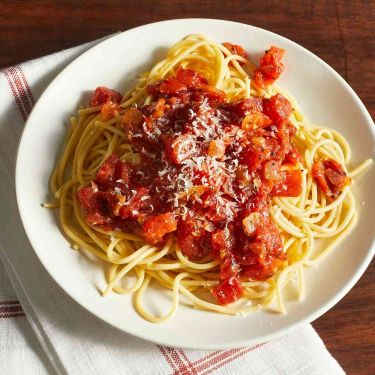If you’ve ever noticed that eating spaghetti leaves you feeling gassy, you’re not alone. Many people experience this post-meal phenomenon, but the cause isn’t always clear.
Let’s take a look at why spaghetti may be the culprit for your gassiness and what you can do about it.
Contents
What Causes Gassiness After Eating Spaghetti?
If you find yourself experiencing gas after eating spaghetti, there are a few potential causes to consider.
First, many people are sensitive to wheat products, which can lead to digestive issues including bloating and excessive gas production.
Additionally, certain types of carbohydrates can be difficult for the body to digest and break down. When digestion is difficult or incomplete, bacteria in the intestines start breaking down these undigested carbohydrates, producing more gas as a result.
Finally, some people who experience gassiness after eating spaghetti may be reacting to gluten. Gluten is a protein found in wheat-based products like pasta that can cause an allergic reaction in some individuals.
If this is the case for you, consider switching to gluten-free pasta options such as rice or quinoa noodles instead of traditional semolina pasta made with wheat flour.
How Can I Avoid Gassiness After Eating Spaghetti?
If you want to avoid gassiness after eating spaghetti without giving up your favorite dish altogether, there are a few things you can do differently when preparing your meal.
- First, try adding ingredients such as garlic or ginger that aid digestion and reduce bloating caused by certain foods like wheat products.
- Additionally, if possible use smaller portions of pasta per serving so that there is less food for your body to digest at once; this will help make digestion easier on your system overall.
- Finally, limit any sauces or toppings that contain added sugars or excess sodium; both of these ingredients can contribute to increased gas production in the body when consumed in large quantities.
Can Spaghetti Sauce Cause Gas?
It is possible that the sauce you add to your spaghetti may be contributing to excess gas production.
Certain types of sauces, such as those made with tomatoes or garlic, can cause digestive distress in some individuals.

In addition, if you’re using a store-bought sauce, check the label for added sugar and sodium content; these ingredients can also lead to increased gassiness when consumed in large quantities.
To reduce the risk of digestive distress, try making your own sauce with fresh ingredients, or look for a low-sodium, sugar-free option at the store.
Why Does Spaghetti Upset My Stomach?
Spaghetti can upset your stomach for a number of reasons.
- First, many people are sensitive to wheat products and can experience digestive distress as a result.
- Certain types of carbohydrates found in pasta can be difficult for the body to break down, leading to increased gas production in the intestines.
- If you’re using a store-bought spaghetti sauce, it may contain added sugar and sodium that can contribute to gastric distress.
- To avoid digestive upset when eating spaghetti, try using smaller portions of pasta per serving and adding ingredients like garlic or ginger which can aid digestion.
- If possible opt for a gluten-free pasta option such as rice or quinoa noodles, as well as a low-sodium, sugar-free sauce.
Is Whole Wheat Spaghetti Better Than Regular Spaghetti?
Whole wheat spaghetti is generally considered a healthier option than regular spaghetti as it contains more fiber and other beneficial nutrients.
Whole wheat pasta is made with complete grain, meaning that all of the dietary fiber, vitamins, minerals, and protein are retained in the finished product.
As a result, whole wheat spaghetti can help keep you fuller for longer and provide a range of health benefits from improved digestion to better cardiovascular health.
That being said, some people find that whole wheat spaghetti is harder to digest than regular spaghetti, leading to increased gassiness.
If this is the case for you, opt for gluten-free pasta options such as rice or quinoa noodles instead.
Does Spaghetti Trigger Ibs?
Spaghetti may trigger IBS symptoms in some people as it contains gluten, a protein found in wheat products that can cause an allergic reaction in certain individuals.
Additionally, the carbohydrates found in pasta are difficult for the body to break down, leading to increased gas production and bloating.
If you experience digestive distress after eating spaghetti, try using smaller portions of pasta per serving and adding ingredients such as garlic or ginger to aid digestion.
Additionally, if possible opt for a gluten-free pasta option such as rice or quinoa noodles, as well as a low-sodium, sugar-free sauce.
What Foods Can Cause Trapped Gas?
Certain foods can cause trapped gas in the intestines, leading to discomfort and bloating.
Foods that are high in fat, fiber, and dairy can be difficult for the body to break down and may contribute to increased gas production.
In addition, foods with added sugars or excess sodium may also trigger trapped gas.
Examples of these foods include fried foods, beans and legumes, whole grains, dairy products such as milk and cheese, broccoli and cauliflower, onions and garlic, carbonated beverages, and processed snacks.
If you experience trapped gas after consuming certain foods, it is best to limit or avoid them in your diet.
Is Spaghetti Hard on the Stomach?
Yes, spaghetti can be hard on the stomach as it contains gluten, a protein found in wheat products that can cause an allergic reaction in certain individuals.
Additionally, certain types of carbohydrates found in pasta can be difficult for the body to break down, leading to increased gas production in the intestines.
If you’re using a store-bought spaghetti sauce, it may also contain added sugar and sodium that can contribute to gastric distress.
To avoid digestive upset when eating spaghetti, try using smaller portions of pasta per serving and adding ingredients like garlic or ginger which can aid digestion.
Does Whole Wheat Spaghetti Cause Gas?
Yes, whole wheat spaghetti can cause gas as it contains gluten and other carbohydrates that are difficult for the body to break down.
Additionally, whole wheat pasta also contains more fiber than regular pasta which can contribute to increased gas production in the intestines.
If you experience trapped gas after consuming whole wheat spaghetti, try using smaller portions of pasta per serving and adding ingredients such as garlic or ginger to help aid digestion.
Additionally, opt for a gluten-free pasta option such as rice or quinoa noodles, as well as a low-sodium, sugar-free sauce.
How Do You Get Rid of Pasta Bloating?
Fortunately, there are ways to reduce pasta bloating and enjoy your favorite dishes without discomfort. Let’s look at some tips on how to do this.
1. Choose Your Pasta Wisely
The type of pasta you choose could have a huge impact on how bloated you feel afterward.
For example, whole wheat pasta is more fibrous than regular pasta, meaning that it takes longer to digest and can cause bloating faster.
Whole-grain noodles may also contain gluten, which can trigger inflammation in people who are sensitive to it.
Therefore, opting for non-gluten or low-gluten alternatives like quinoa or rice noodles is a much better option for avoiding bloating.
2. Eat Mindfully
When eating pasta, take your time and savor the flavor instead of wolfing down your food as quickly as possible.
Eating slowly encourages mindful eating; chewing thoroughly and paying attention to signals from your body that indicate when you’re full will help prevent overeating and lessen the chances of getting bloated afterward.
Additionally, be aware of portion sizes; large servings could lead to more bloating than smaller meals.
3. Limit Sauce Intake
Pasta sauces typically contain high levels of sodium, which can contribute to water retention in our bodies and lead to uncomfortable bloating sensations after we eat them.
To minimize this effect, opt for lighter sauces such as tomato sauce or olive oil-based sauces instead of creamy versions like Alfredo sauce or pesto sauce.
On top of that, adding fresh herbs or spices like garlic or pepper can enhance the flavor without adding too much sodium into the mix!
How Long Does It Take for Spaghetti to Leave the Stomach?
It typically takes between 2-6 hours for spaghetti to leave the stomach, depending on how large your portion was and how quickly you ate it. If the noodles are difficult to digest due to gluten, it may take longer than 6 hours for them to exit the stomach.
Eating smaller portions of pasta can help shorten this time frame, as well as adding ingredients like garlic or ginger which can aid digestion.
Additionally, opting for gluten-free pasta such as rice or quinoa noodles may also help reduce the stomach’s digestion time.
Is Spaghetti Sauce Bad for Your Stomach?
It depends on the type of sauce you are using.
For instance, a homemade spaghetti sauce that is made with fresh ingredients such as tomatoes, herbs, and spices is healthier for your stomach than a store-bought version.
Although store-bought sauces often contain additional preservatives to extend shelf life, they may also contain added sugar and salt, which can be hard on the stomach.
Therefore, it is best to opt for a homemade sauce that contains natural ingredients instead of store-bought sauces with added preservatives.
Additionally, if you choose to buy a store-bought sauce, make sure to read labels carefully in order to avoid those high in sodium and sugar.
Conclusion:
No one likes feeling bloated and gassy after a meal—especially when it’s something they enjoy like spaghetti!
While it isn’t always easy to pinpoint why exactly this happens in some cases (and not others), understanding potential causes like sensitivity to wheat products or gluten intolerance helps us figure out how we can modify our recipes accordingly so we don’t have to miss out on our favorite dishes entirely!
By making sure we stick with smaller portions and add digestive-friendly ingredients whenever possible – we can ensure our meals are just as delicious as ever – minus all that uncomfortable bloat!
Amazon and the Amazon logo are trademarks of Amazon.com, Inc, or its affiliates.

